
Those that have been following my blog for a longer time know that I’ve been talking a lot about making the Linux desktop and mobile platforms location aware.
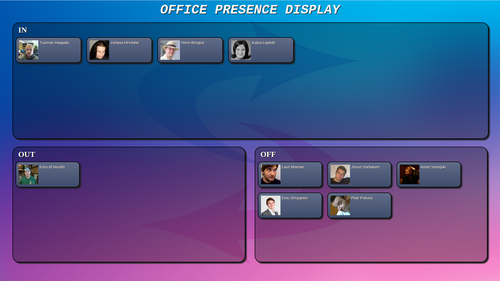
As part of the SmarcoS project, we have been investigating how to make workplaces smarter through sensors and context awareness. Here is a video showing what we’ve built:
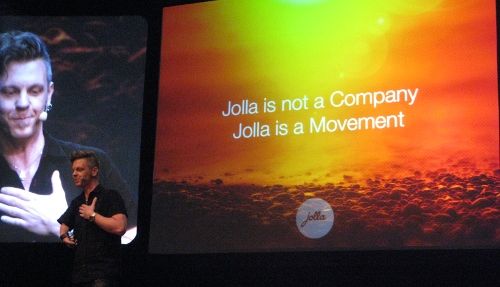
This week has been a busy one for a hacker-nomad. Weekend in Paris for the JS.everywhere conference, then on Monday a talk at the Hamburg JavaScript meetup. And now I’m in Helsinki. Slush, the conference I’m attending, is the biggest start-up event in Nordic countries. But even at that, it seems the Jolla announcements of today have been able to...
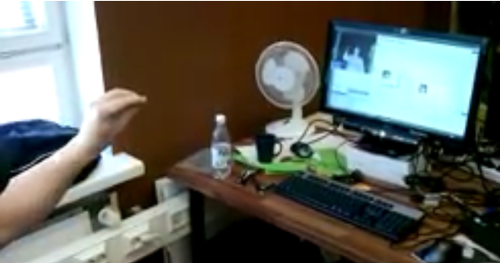
If today’s Google I/O keynote where they parachuted to the conference center from a Zeppelin while streaming the whole experience on a Hangout via Project Glass wasn’t enough future for you, here is another thing.
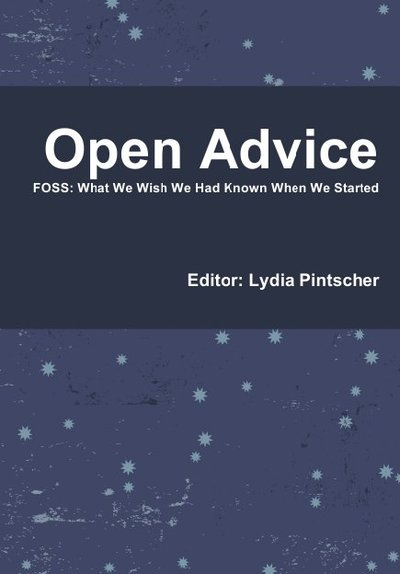
I seem to have not blogged about this, but Open Advice, our book on Free and Open Source Software: what we wish we had known when we started, was published last month. The book was edited by Lydia Pintscher and includes essays from 42 authors, many of whom you'll recognize if you tend to go to FOSS conferences. The LWN...
As mentioned in the earlier call for presentations, we're running a track on Open Mobile Linux in FOSDEM this Saturday. Room AW1.120 at the ULB campus in Brussels. From the CfP: Our primary goal is to facilitate meetups, collaboration and awareness between different projects and communities within Open Mobile Linux and provide a place to present directions, ideas and your...
At FOSDEM 2012 we will have a devroom related to Open Mobile Linux. Our primary goal is to facilitate meetups, collaboration and awareness between different projects and communities within Open Mobile Linux and provide a place to present directions, ideas and your projects themselves. By Open Mobile Linux we mean any open source projects revolving around typical non-desktop/server Linux, such...
Qt 5 is bringing JS at the same level of support as C++—Quim Gil, Nokia
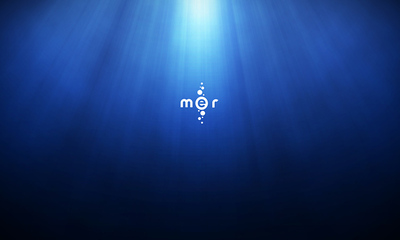
These are tough times for fans of open mobile environments. Android is less and less open, Symbian was closed again, HP stopped making webOS devices, and now Intel abandoned MeeGo to work with Samsung and operators instead. So, what is the community to do? One option is to follow the lead of the big companies, hoping that Tizen works, or...
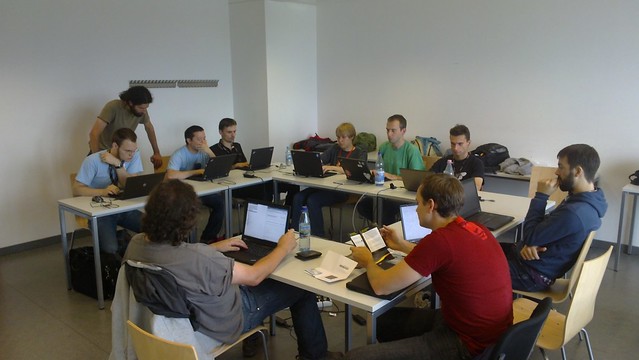
As usual, Desktop Summit 2011 has been a lot of fun. I’ve been to most of the GUADEC and aKademy free desktop events in the past few years, but this was the first time I didn’t give a talk. Even that way, it was definitely worth spending a week in Berlin.
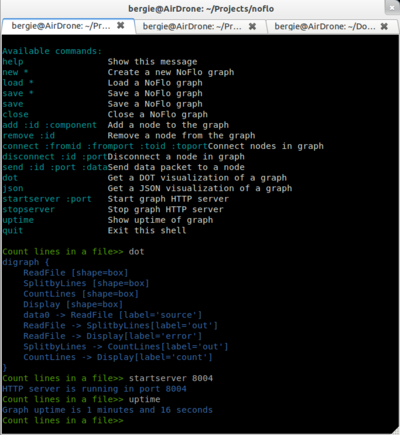
Like many, I'm currently in Berlin for Desktop Summit, the combined conference of the GNOME and KDE communities. It is a lot of fun to see all the familiar faces, and talk about the different projects going on! Now, one of the things I've talked about with people is NoFlo, my new tool that brings Flow-Based Programming to Node.js. What...

Disclaimer: I’m a software developer with a background in Nokia’s Maemo mobile Linux ecosystem. I’ve built both software and community services for it. As a Maemo enthusiast, I’ve also been following MeeGo with interest, and am helping to build some of the project infrastructure there as well. But I do not speak with the authority of the MeeGo project, and...
There is currently quite stern discussion going on between GNOME, Canonical and KDE about collaboration on the free desktop. Angry words have been written, and I believe much of the tension arises from the situation with MeeGo. Suddenly many developers and projects feel much more marginalized than what the future looked like, pre-112. Hopefully cooler heads will prevail before the...
In the coming years another billion people will get online. They will do it with their smartphones instead of what we consider computers. And their experience will be quite different from ours when we initially started using the internet.Despite its promises, it looks like the post-PC ecosystem will be a lot more restrictive than the PC one was even in...
Yesterday, after returning from a trip to Kenya, the hard drive on my old MacBook Air decided to die. Eventually I was able to recover most of it, but many files on my home directory were simply gone. But this isn't such a big problem, as everything of importance is anyway online, conforming with the Linus backup strategy: Backups are...
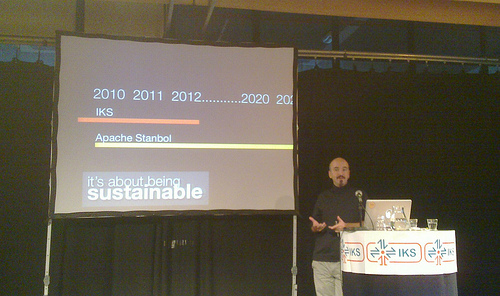
Snapshot from Bertrand's presentation in the Amsterdam IKS workshop: what does being an Apache project bring to the table? The answer is sustainability. IKS is an EU-funded project which will eventually end. Proper project governance handled together with the Apache Software Foundation can help the software to survive and thrive for long after that. Sustainability is something that is critical...
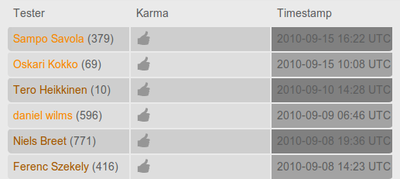
We had a session about application QA in last weekend's GSoC Mentor Summit. I explained how the Maemo Downloads approval process works in a completely open, crowdsourced way. This differs from many distributions where approval of new packages involves obscure decisions and secret handshakes. Some guidelines: Separate your core distribution and application packages Approval process should have three layers: development,...
Some days ago I ran into an interesting comment in a review of the Ubuntu 10.10, released yesterday: in an era where you can do 90 percent of your work through a browser window, Ubuntu needs polish, usability, compatibility, and a likable look and feel more than anything. With Windows 7, Microsoft's dominant OS is no longer the big, obvious...
Jos Poortvliet did an interview with me for dot KDE in this summer's aKademy and it has been online for a while now. In it we discuss things like Midgard as a storage engine for desktop applications, and Maemo's open QA process for Downloads applications. Some excepts: At maemo.org we have an appstore for FOSS applications on the Maemo platform....
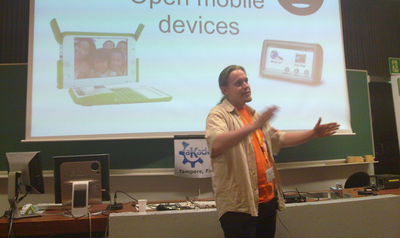
aKademy 2010 was hosted in the sunny city of Tampere by the Finnish Centre for Open Source Solutions, an organization that I'm a steering group member of. In addition to helping a bit with the arrangements and organizing the Midgard Gathering there, I also gave a talk about GeoClue, the positioning framework for Linux desktops. Presentation slides (PDF) Video of...
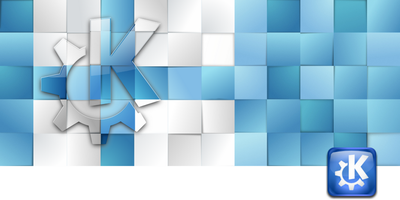
We tried to get the combined GUADEC and aKademy conferences to Tampere in 2009, but a warmer place unfortunately won. However, we will be hosting this year's aKademy so at least KDE and Qt fans will get to enjoy this beautiful northern industrial city. The main conference will be held at the Tampere University over the weekend, and then the...
Apple iPad is certainly interesting. It seeks to challenge the concept of PCs by providing something that is at the same time more personal, and a lot easier to use. The personal computer of the future. Gone is difficult file organization - instead, applications use their own purpose-build content repositories. Instead of seeking software from many places, all of it...













